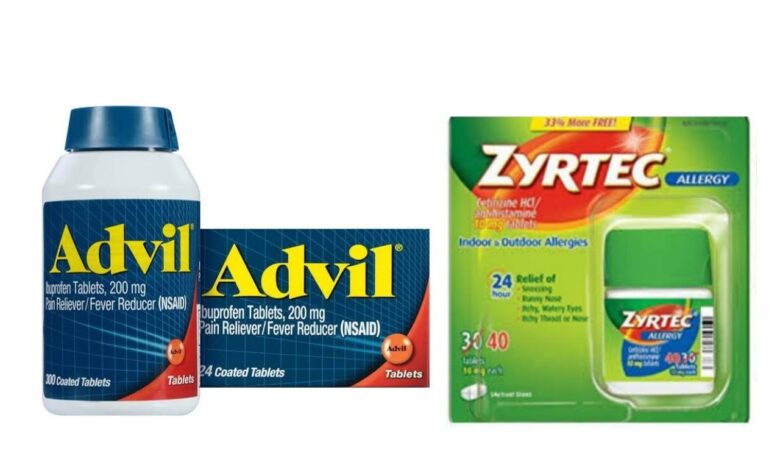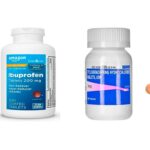Can You Take Zyrtec and Advil Together?

Mixing any combination of prescription drugs, over-the-counter drugs can be unpredictable and dangerous. Most fatal overdoses involve the use of more than one type of drug (poly-drug use).
Poly-drug use is dangerous because different drugs act on our bodies in different ways. The harmful effects are magnified by using more than one drug type.
What is Zyrtec?
Zyrtec is a brand of cetirizine, a second-generation oral antihistamine that reduces the effects of the natural chemical histamine in the body. Histamine can produce symptoms of sneezing, itching, watery eyes, and a runny nose.
Zyrtec is used in adults and children to treat cold or allergy symptoms such as sneezing, itching, watery eyes, or runny nose. Zyrtec is also used to treat itching and swelling caused by chronic urticaria (hives).
Other common OTC brands with cetirizine as the main active ingredient include:
• Aller-Tec
• Alleroff
• Zyrtec-D
• Wal Zyr-D
• Cetiri-D
What is Advil?
Advil is a brand of ibuprofen that belongs to a class of medications called NSAIDs. It works by stopping the body’s production of a substance that causes pain, fever, and inflammation. Prescription ibuprofen is used to relieve pain, tenderness, swelling, and stiffness caused by osteoarthritis (arthritis caused by a breakdown of the lining of the joints) and rheumatoid arthritis (arthritis caused by swelling of the lining of the joints). It is also used to relieve mild to moderate pain, including menstrual pain (pain that happens before or during a menstrual period).
Nonprescription ibuprofen is used to reduce fever and to relieve minor aches and pain from headaches, muscle aches, arthritis, menstrual periods, the common cold, toothaches, and backaches. For strains and sprains, some doctors and pharmacists recommend waiting 48 hours before taking ibuprofen as it may slow down healing. If you are unsure, speak to your doctor or pharmacist. Ibuprofen is typically used for period pain or toothache.
Ibuprofen acts by stopping the creation of certain prostaglandins, which are lipids that deal with injury or illness and are active in the pathways that control inflammation, pain, and fever. Ibuprofen inhibits the action of cyclooxygenase, which is necessary for prostaglandin creation. Ibuprofen is not selective and COX-2 prostaglandins are responsible for the desired analgesic and antipyretic effects.
Can you take Zyrtec and Advil?
Yes, you can take Zyrtec together with Advil, to relieve symptoms of sneezing, itching, watery eyes, and runny nose that are accompanied by mild to moderate pain or fever.
How to take Zyrtec?
Adults and children, 6 years and older can take cetirizine capsules and tablets.
The usual dosage for adults younger than 65 years and children who are 6 years and older is one 10-milligram (mg) dose per day.
You shouldn’t take more than 10 mg in 24 hours. Your doctor may recommend a 5-mg dose once or twice per day if your allergies are mild.
Talk to your doctor about dosage for people who:
• are 2 to 6 years old
• are older than 65 years
• have liver or kidney disease
How should Advil be used?
Prescription ibuprofen comes as a tablet to take by mouth. It is usually taken three or four times a day for arthritis or every 4 to 6 hours as needed for pain. Nonprescription ibuprofen comes as a tablet, chewable tablet, suspension (liquid), and drops (concentrated liquid). Adults and children older than 12 years of age may usually take nonprescription ibuprofen every 4 to 6 hours as needed for pain or fever. Children and infants may usually be given nonprescription ibuprofen every 6 to 8 hours as needed for pain or fever, but should not be given more than 4 doses in 24 hours. Ibuprofen may be taken with food or milk to prevent stomach upset. If you are taking ibuprofen on a regular basis, you should take it at the same time(s) every day. Follow the directions on the package or prescription label carefully, and ask your doctor or pharmacist to explain any part you do not understand. Take ibuprofen exactly as directed. Do not take more or less of it or take it more often than directed by the package label or prescribed by your doctor.
Ibuprofen comes alone and in combination with other medications. Some of these combination products are available by prescription only, and some of these combination products are available without a prescription and are used to treat cough and cold symptoms and other conditions. If your doctor has prescribed a medication that contains ibuprofen, you should be careful not to take any nonprescription medications that also contain ibuprofen.
Swallow the tablet whole; do not chew or crush it.
If you are selecting a product to treat cough or cold symptoms, ask your doctor or pharmacist for advice on which product is best for you. Check nonprescription product labels carefully before using two or more products at the same time. These products may contain the same active ingredient(s) and taking them together could cause you to receive an overdose. This is especially important if you will be giving cough and cold medications to a child.
Nonprescription cough and cold combination products, including products that contain ibuprofen, can cause serious side effects or death in young children. Do not give these products to children younger than 4 years of age. If you give these products to children 4 to 11 years of age, use caution and follow the package directions carefully.
If you are giving ibuprofen or a combination product that contains ibuprofen to a child, read the package label carefully to be sure that it is the right product for a child of that age. Do not give ibuprofen products that are made for adults to children.
Before you give an ibuprofen product to a child, check the package label to find out how much medication the child should receive. Give the dose that matches the child’s age on the chart. Ask the child’s doctor if you don’t know how much medication to give the child.
Shake the suspension and drops well before each use to mix the medication evenly. Use the measuring cup provided to measure each dose of the suspension, and use the dosing device provided to measure each dose of the drops.
The chewable tablets may cause a burning feeling in the mouth or throat. Take the chewable tablets with food or water.
Stop taking nonprescription ibuprofen and call your doctor if your symptoms get worse, you develop new or unexpected symptoms, the part of your body that was painful becomes red or swollen, your pain lasts for more than 10 days, or your fever lasts more than 3 days. Stop giving nonprescription ibuprofen to your child and call your child’s doctor if your child does not start to feel better during the first 24 hours of treatment. Also, stop giving nonprescription ibuprofen to your child and call your child’s doctor if your child develops new symptoms, including redness or swelling on the painful part of his body, or if your child’s pain or fever gets worse or lasts longer than 3 days.
Do not give nonprescription ibuprofen to a child who has a sore throat that is severe or does not go away, or that comes along with fever, headache, nausea, or vomiting. Call the child’s doctor right away, because these symptoms may be signs of a more serious condition.





